Whisky or Whiskey? I've wondered how the spelling came about & how to remember when to use which term. Hint: use an 'e' with Midleton & Tullamore D.E.W. Irish Whiskey!
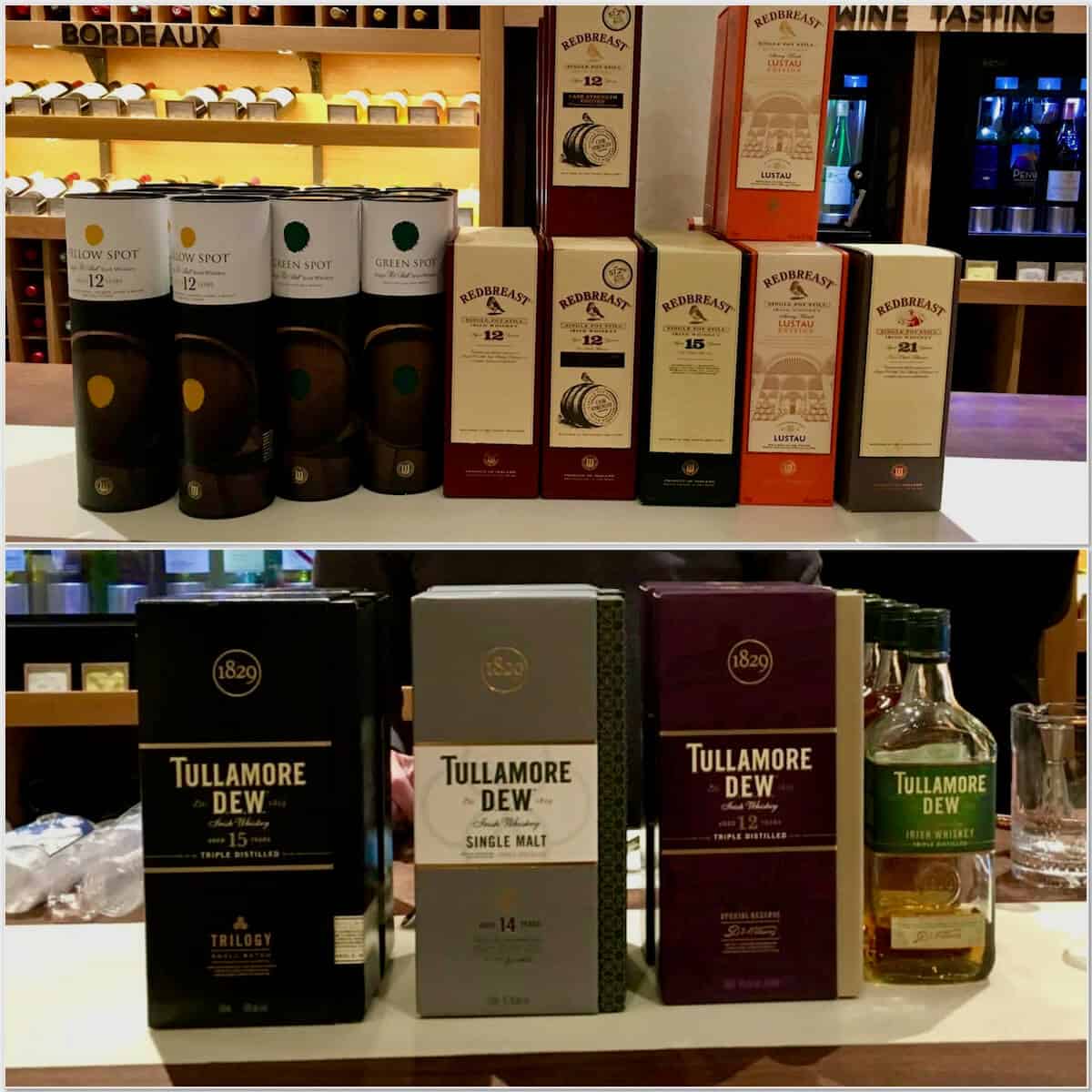
Whisky or Whiskey? An "e", yes or no?
I've wondered how the whisky or whiskey situation came about, and how to remember when to use which term. When I went to research this topic, there were a number of different explanations.
Whisky or Whiskey Mnemonics
From thekitchn, here's a quick way to remember how some of the world's biggest producers spell their products:
- Countries that have E's in their names (UnitEd StatEs and IrEland) tend to spell it whiskEy (plural whiskeys)
- Countries without E's in their names (Canada, Scotland, and Japan) spell it whisky (plural whiskies)
Ok, but whyyyyyy is it different?! (Sorry, I'm in a whiny mood today). Here are but a few of the possible explanations:
[Warning...lots of explanation below...feel free to hop along to the tasting notes if you're short on time]
The Typewriter Theory
According to the sources cited from thekitchn, the spelling problem is based on copy editing style vs. the actual liquor style being discussed.
The manufacture of each of type of whisky/ey is guided and regulated by the government of the spirit's country of origin. As a result, Canadian whisky, for example, is a whole different animal from Scotch whisky, Irish whiskey, and American whiskey.
The problem seemed to arise when a copy editor chose a particular style used by their organization without regard to the country of origin.
The New York Times had a blanket policy of using "whiskey" for everything, then recently changed to the spelling preferred by the country of origin after receiving many complaints (look how inclusive they are). So the spelling is back to being decided by the manufacturer and country of origin again, at least for the NYT.
The Quality Theory
Another explanation comes from Men's Journal. While this site also talks about the spelling preferences from the country of origin, they explained the spelling difference thusly:
"Where the original variation in spelling came from is still a matter of debate. 'Legend has it that during the 1800s, most Scotch Whisky was considered as very low quality,' says Fletcher (uncredited source). Due to this, American and Irish distillers began adding the 'e' in order to show a point of distinction to consumers that the quality of their whiskey was higher than that of Scotch. Today, it's little more than a regional tradition — one that causes its share of confusion."
The site goes on to say that while US distillers generally use the 'e', there are exceptions, e.g. George Dickel, Old Forester, and Maker's Mark, the latter as a tribute to the distiller's Scottish heritage.
Some people just gotta be different...
The Duality Theory
From the most venerable of sources (ok, it's Wikipedia...how much research are you expecting me to do?), comes this sweet tidbit:
"There are two schools of thought on the issue. One is that the spelling difference is simply a matter of regional language convention for the spelling of a word, indicating that the spelling varies depending on the intended audience or the background or personal preferences of the writer (like the difference between color and colour; or recognize and recognise), and the other is that the spelling should depend on the style or origin of the spirit being described."
Now I take this explanation to mean that the spelling is based on the conventions of the region or the writer and/or the type of spirit we're discussing and where it came from. Kind of wish-washy, if you ask me.
These are just the first three sites that came up when I googled "whisky vs whiskey spelling." There were about 123,000 other places I could visit for an explanation, but, well, who has that kind of time.
Spelling doesn't matter when tasting whiskey
The major difference between Irish whiskey and Scotch whisky is that the former is distilled three times instead of two. Irish Whiskey can use both malted and unmalted barley in its mash, while single malt scotch only uses malted barley.
The unmalted barley introduces a greener aroma and flavor to the spirit (think grass or hay), and the triple distillation produces a lighter body.
Because of the gentler nature of Irish Whiskey, it makes a great flavoring, like in these Irish Whiskey Marshmallows. Add them to a cup of coffee for the best Irish coffee you’ve ever had!
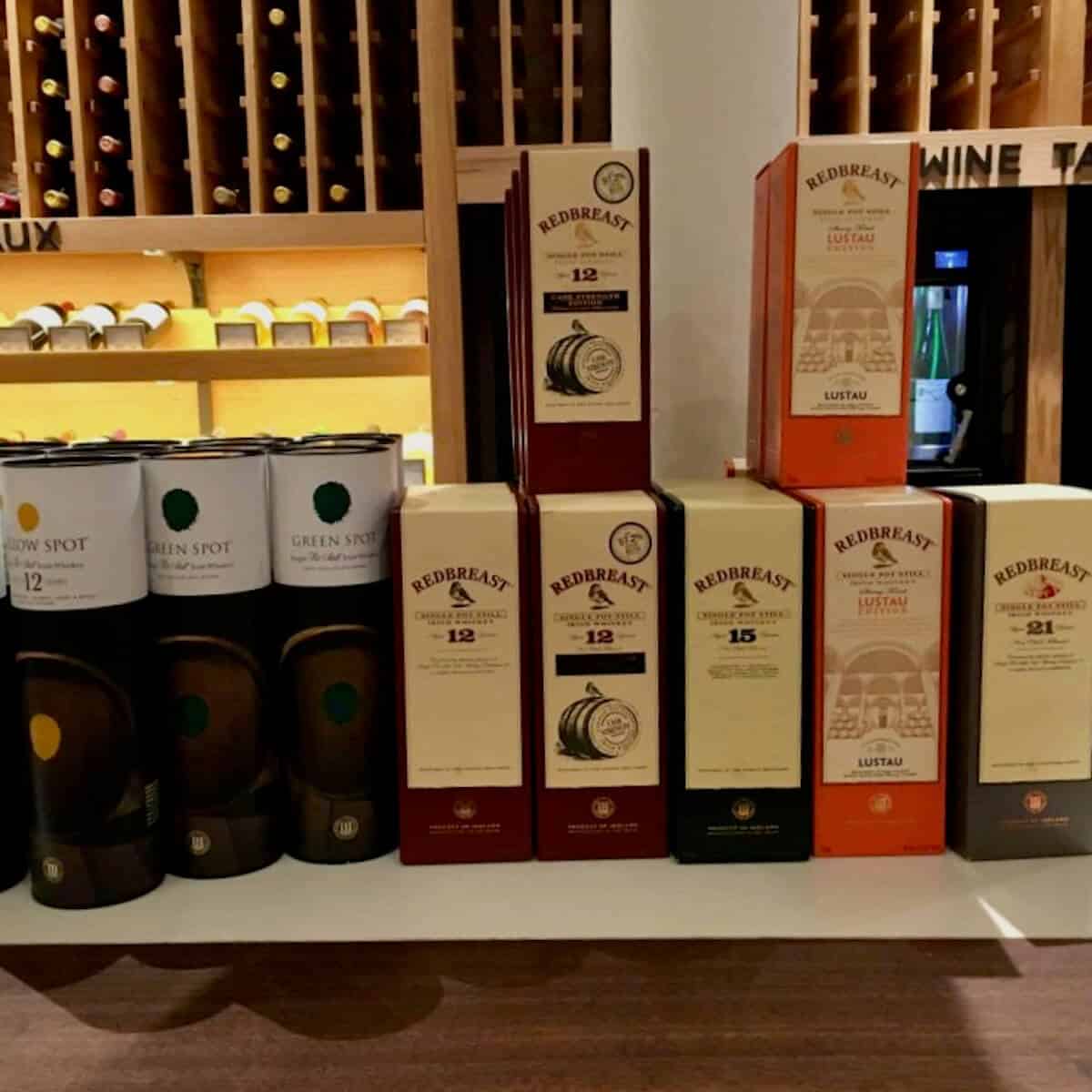
Midleton Distillery Review
at Gordon's DTX, March 8, 2017
Alex Thibault, the Brand Ambassador for John Powers and all pot still whiskey out of Midleton Distillery, headed up our tasting. He is the expert on Irish Whiskey.
Midleton is part of the group that produces Jameson (the best selling Irish whiskey in the world), Tullamore D.E.W., Powers, Paddy, Redbreast, Green Spot, and Yellow Spot. The distiller's tasting notes can be found on Jameson.
Green Spot Single Pot Still
Tasting Notes
- Nose: apples, honey
- Taste: starts smooth, very sweet, full body
- Finish: cotton candy
- Comments: higher unmarked barley, almost too sweet
Yellow Spot 12yr
Tasting Notes
- Nose: honey, sweet, light
- Taste: smooth start, light body, some cinnamon, creamy
- Finish: slight spicy grows to finish,
- Comments: wine cask influence, bourbon, sherry, Malaga wine cask
Redbreast 12yr
Tasting Notes
- Nose: very lightly sweet, not much aroma, floral
- Taste: very smooth entrance, lightly oily but light body, sweet and spicy
- Finish: warm spices at the very end
Comments
Redbreast 12yr Cask Strength
Tasting Notes
- Nose: green apple, light gran
- Taste: medium body, honey & vanilla, toffee
- Finish: toffee, cayenne, cloves, nutmeg
- Comments: cask strength adds some bite; w/ water: grass notes, green apple, hops, more bitter
Redbreast Lustau
Tasting Notes
- Nose: cooked fruit, hay underneath, burnt sugar
- Taste: sneaks in with the cooked fruit, brown sugar candy, light body but more texture
- Finish: exits sweetly, brown sugar, slight menthol at the end
- Comments: sherry really adds character, still light in body, Very nice!
Redbreast 15yr
Tasting Notes
- Nose: clover honey, lemony,
- Taste: thick body, parsley, brown sugar, apples,
- Finish: sharp, ginger, apples, bitter lemon
- Comments: different nose from the taste, the bitterness is hard to nail down
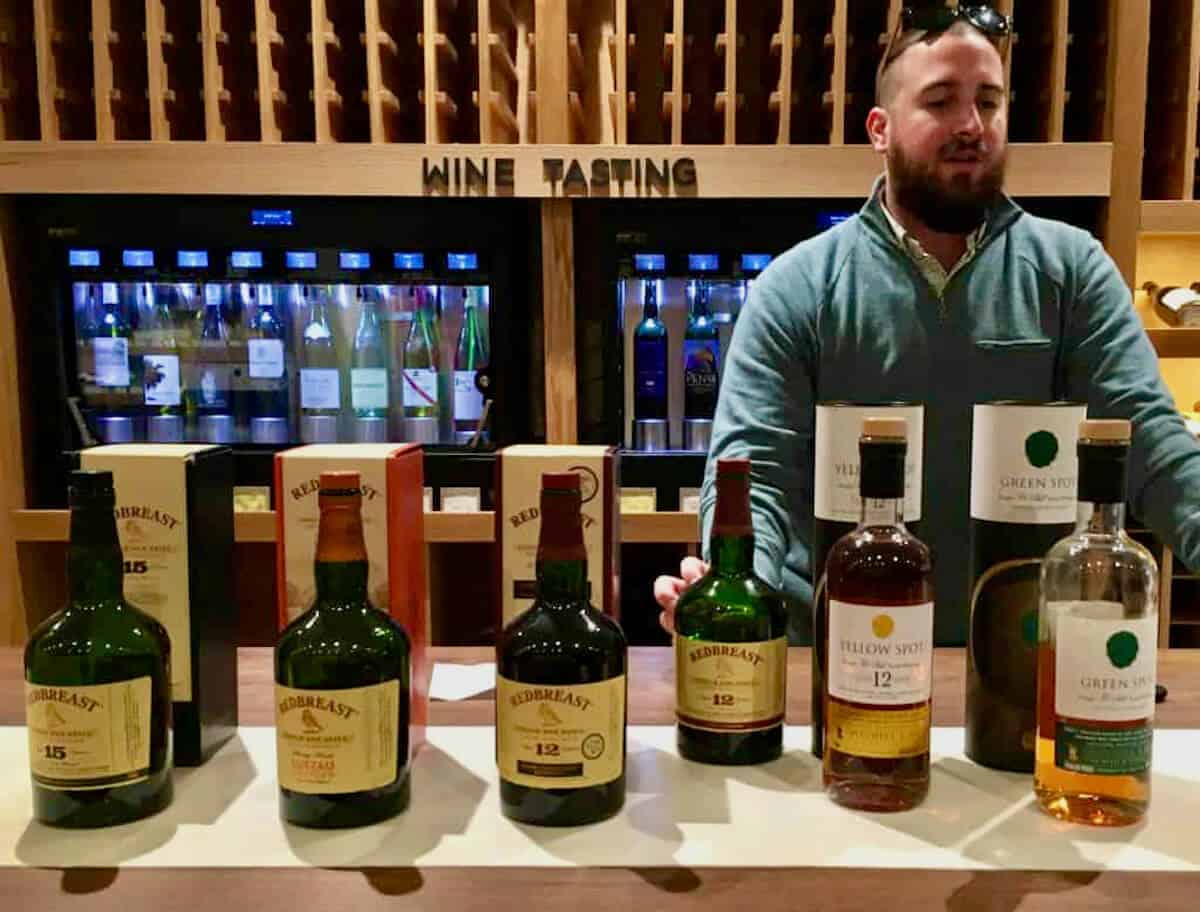
Tullamore D.E.W. Review
at Gordon's DTX, March 15, 2017
Tullamore started production in Tullamore, Ireland in 1829 and quickly became one of the most popular Irish whiskies in the world. The D.E.W. initials came from distillery manager Daniel E. Williams.
Similar other Irish Whiskey, Tullamore closed its distillery doors in 1963. They officially started producing whiskey again at their new facility just down the road from the original building in 2014.
Tullamore D.E.W.
Tasting Notes
- Nose: hay, fruit
- Taste: smooth entry, grass, easy & approachable
- Finish: easy finish, no pepper, doesn't linger
- Comments: 'D.E.W.' comes from the initials of a General Manager at the Tullamore distillery in the later 19th Century, Daniel Williams.
Tullamore D.E.W. 12yr
Tasting Notes
- Nose: cinnamon, honey, nutmeg
- Taste: smooth entry, pears, grassy, light body, sips for summer, lemons
- Finish: cinnamon lingers
- Comments: My favorite...best of the lot
Tullamore D.E.W. 14yr
Tasting Notes
- Nose: honey, light odor, pears
- Taste: slight cinnamon, cloves
- Finish: pear to finish, fruity, med lingering, higher spice grows
- Comments: aged in Madeira, sherry, ex bourbon casks, fuller body, 100% malted barley, very nice character
Tullamore D.E.W. 15yr
Tasting Notes
- Nose: tropical fruit, peaches
- Taste: smooth entry, bananas, no spice, light body
- Finish: sweet finish, light, rum
- Comments: Also a favorite
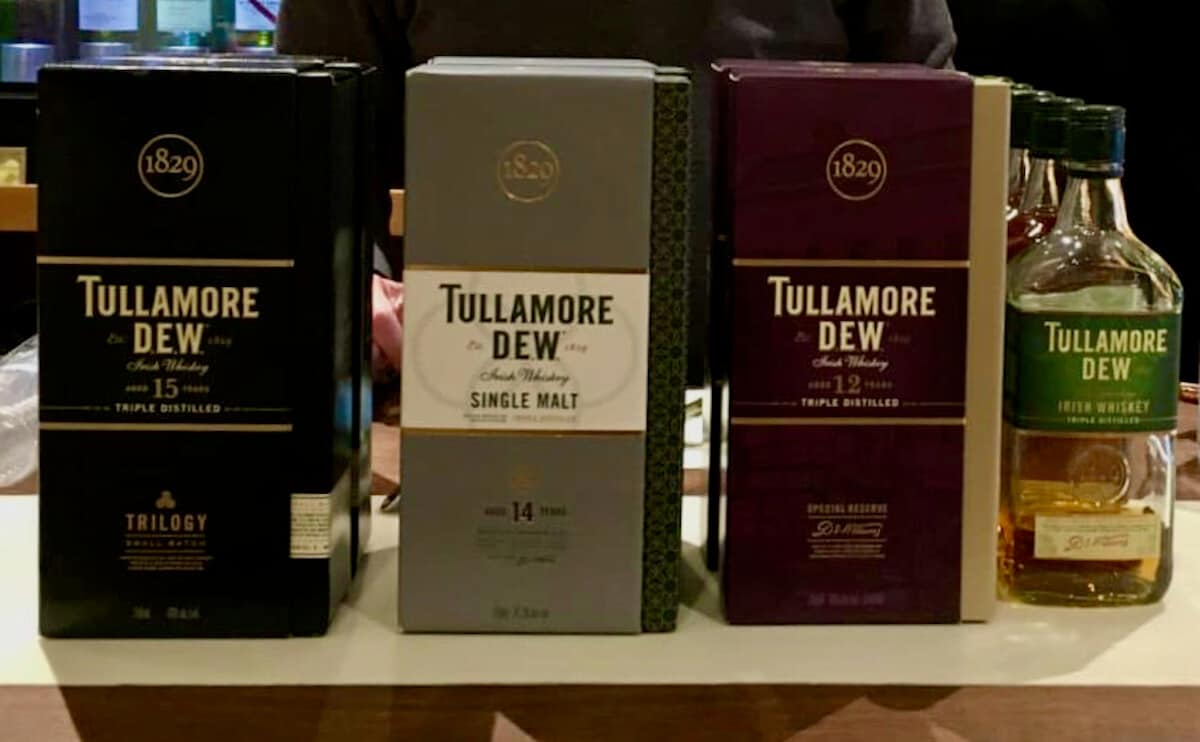
Final thoughts
All these expressions definitely felt lighter in the mouth, smooth and nicely drinkable. The green influence from the unmalted barley was quite noticeable, especially in the Tullamore D.E.W. offerings.
These Irish whiskies are something I could envision drinking on a summer's day.
So what do you think about the 'e' question? I actually like having the distinction...it's just another identifier tool for me, helping with my set of expectations. Do you have another theory for the difference in spelling? If so, I'd love to hear it.
Either way you spell it (or maybe 'ither' way?), whisk(e)y is great to drink!

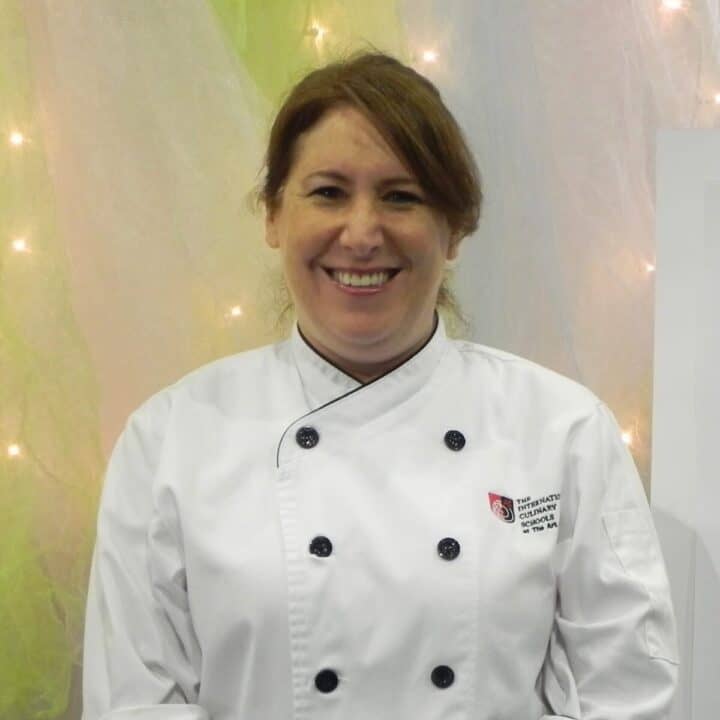
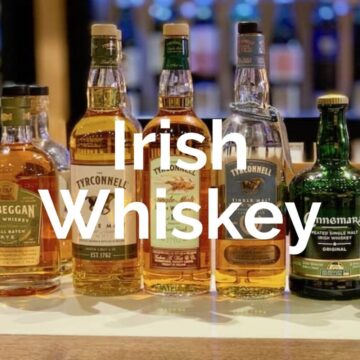
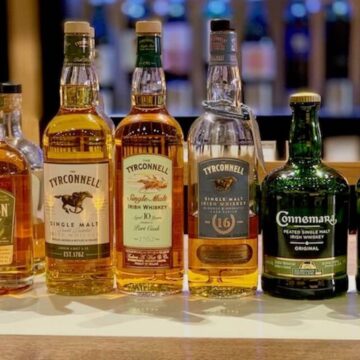
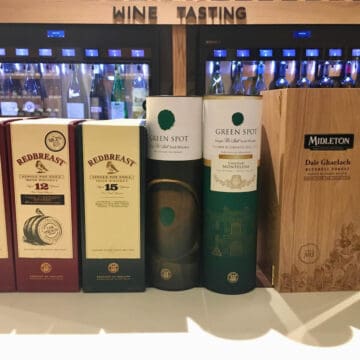
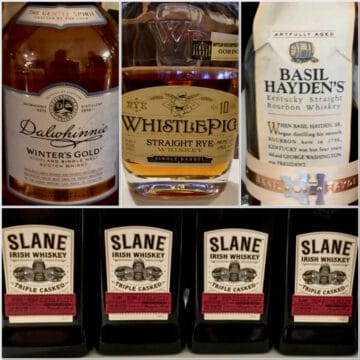
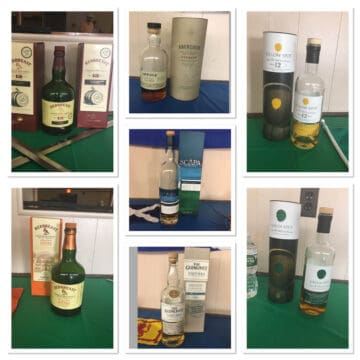
jonathankurtzman says
I connect the spelling difference to pronunciation possibilities with the y ending being more of a short i into a double ee sound and the ey ending being more of a short a into a longer a. I know that vowels differ in Scottish and Irish Gaelic.